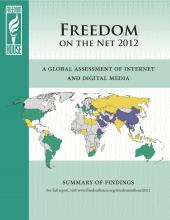Freedom on the Net 2012
By Freedom House • September 25, 2012 This report is the third in a series of comprehensive studies of internet freedom around the globe and covers developments in 47 countries that occurred between January 2011 and May 2012. Over 50 researchers, nearly all based in the countries they analyzed, contributed to the project by researching laws and practices relevant to the internet, testing the accessibility of select websites, and interviewing a wide range of sources.
This report is the third in a series of comprehensive studies of internet freedom around the globe and covers developments in 47 countries that occurred between January 2011 and May 2012. Over 50 researchers, nearly all based in the countries they analyzed, contributed to the project by researching laws and practices relevant to the internet, testing the accessibility of select websites, and interviewing a wide range of sources.
This year’s findings indicate that restrictions on internet freedom in many countries have continued to grow, though the methods of control are slowly evolving, becoming more sophisticated and less visible. Brutal attacks against bloggers, politically motivated surveillance, proactive manipulation of web content, and restrictive laws regulating speech online are among the diverse threats to internet freedom emerging over the past two years. Nevertheless, several notable victories have also occurred as a result of greater activism by civil society, technology companies, and independent courts, illustrating that efforts to advance internet freedom can yield results.
Burma
While the military junta that ruled Burma for decades was interested in expanding information and communication technologies (ICTs) for business and propaganda purposes, it also made aggressive attempts to restrict access to digital media and control online content. Elections in November 2010 changed this dynamic. Though widely condemned as flawed, the polls brought into office a nominally civilian government, led by former general Thein Sein and supported by a military-backed party, in March 2011. Since then, the political landscape has opened somewhat, with positive implications for internet freedom. Previously censored news websites have been unblocked, citizens imprisoned for their online activities have been released, and opposition political parties have been able to use online tools to mobilize supporters.
Nevertheless, significant obstacles to greater internet freedom persist. Harsh media laws remain in effect and could be used at any time to punish a wide range of online expression, the technical censorship system appears intact, and some opposition blogs continue to be blocked. Consumer prices for ICTs are still among the highest in the world. Meanwhile, even as some members of the government and private sector begin to explore reforms to the telecommunications sector, new challenges have emerged, including weak coordination between different agencies and resistance from the military and government cronies who have lucrative vested interests in retaining the status quo.
As such, the state continues to dominate the telecommunication sector, with few signs of upcoming fundamental reform. Although mobile phone use and the presence of cybercafes expanded in 2011, the quality of service for phones and internet connectivity is at times excruciatingly poor and only a small percentage of the population has regular access to ICTs, particularly in rural areas. Where network infrastructure has improved, it has been biased towards the business sector or preparation for international events Burma is scheduled to host, such as the summit of the Association of Southeast Asian Nations (ASEAN) in 2014.
The state-owned Myanmar Post and Telecommunications (MPT) company launched the first official email service in November 1997. The 2002 establishment of the first private internet service provider (ISP), Bagan Cybertech, helped to increase the number of users in the country, though the company was later taken over by the junta. The government’s first attempt to restrict internet freedom was through the 1996 Myanmar Computer Science Development Law, which made possession of an unregistered computer modem and connection to unauthorized computer networks punishable by up to 15 years in prison. Other laws passed later have reinforced a climate of fear and self-censorship surrounding online interactions, though in 2011, internet users pushed the boundaries of permissible speech and mobilized successful campaigns for political or social change.
Download the full Burma section of the report here.
Tags: Freedom House, Freedom of Expression, Internet FreedomThis post is in: Human Rights, Spotlight
Related PostsMyanmar: Freedom on the Net 2015
Myanmar Charges 17 Journalists
Burma Continues to Repress Critical Voices
Freedom in the World 2013: Burma
Freedom House Condemns Crackdown on Peaceful Protesters in Burma









 All posts
All posts